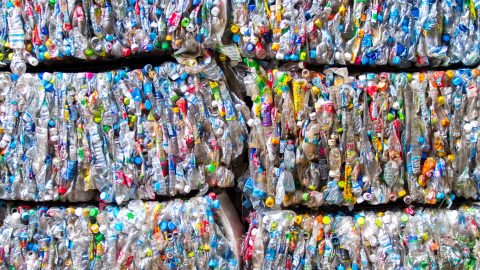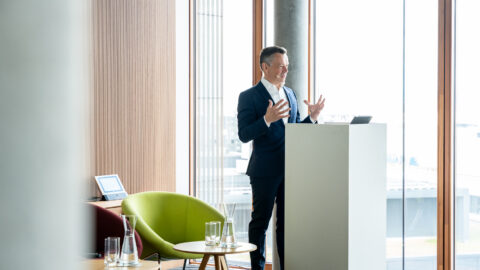Plastic is number one: since 1960, global plastics production has increased by a factor of more than 20x. 322mn tonnes have been produced worldwide. According to current estimates, this number will double again over the coming 20 years.
The most important reasons are the wide variety of uses and the low cost involved. Modern plastics can also come with positive applications from a sustainable perspective and facilitate significant CO2 savings throughout their lifecycle, particularly in the field of light-weight design in aviation or car design.
That being said, the basic input material in this context continues to present a problem. At the moment, plastics are mainly produced from fossil raw materials. Bio-plastic only accounts for 1% of global plastics production. This, however, has to be seen in the context of the fact that only a relatively small share (i.e. 6%) of the oil produced globally is used for plastics production. Still, for the oil industry, the petrochemical treatment of crude oil and the production of plastics provide a high-margin alternative to the production of fuel and its CO2-intensive combustion.
No real alternative yet
This remains a necessary state of affairs, given that bio-plastics do not offer a real alternative at this point. N.B. bio-plastics are plastics that come with at least one of two features: a) they are based on renewable raw materials and/or b) they are bio-degradable. While the use of bio mass reduces the dependence on crude oil, the process also sets up a potential competition with food production, for example when corn starch or potatoes are used as basis. This means that the use of renewable raw materials is to be regarded as positive in particular when they are of the second or third generation, i.e. wood waste or algae.
The high degree of bio-degradability of bio-plastics at the same time limits their use. Plastics are often used for their high durability. Bio-plastics, on the other hand, are mostly used for disposable items that have a limited life. This contradicts the sustainable avoidance of plastics and waste and potentially harms the consciousness among consumers for the recyclability of products.
Bio-degradability is still an enormous advantage. Plastic can theoretically be recycled, but in practice a large part tends to be dumped in the environment, putting the ecosystems at risk (e.g. in the form of microplastics). According to estimates, a third of all plastic waste worldwide ends up in the soil or the ocean.
Disposal is a socio-political problem
The improper disposal of plastic waste is a socio-political problem that is particularly severe in South-East Asia, where lack of effective waste disposal systems is profound. Given that plastic turns into a problem especially when it ends up in the environment, our research partners believe that companies have limited clout when it comes to contributing to the improvement of the situation. That being said, the avoidance of disposable packaging and the sensitisation in favour of more recycling are important steps that need to be taken so as to prevent the plastic islands from growing any more in the oceans.
Even if the collection of plastic waste works, recyclability has to be a crucial parameter in the product design stage already. At the moment, the collected plastic is very inhomogeneous. The various polymers have other substances mixed in such as pigments, ink, or adhesives. This makes clean recycling harder and creates a downward spiral, i.e. the downcycling to more and more low-grade kinds of plastic. The cradle-to-cradle principle counters this tendency by facilitating a real closed loop economy on the back of intelligent product design. With this kind of product, all input materials can be recycled in their original quality.
A pilot project by OMV called ReOil goes down a similar route. Instead of burning or “downcycling” plastic waste, it is recycled into crude oil that can then be refined into any desired product.
Still, the focus of a sustainable plastic economy is on avoidance, as the New Plastics Economy Initiative by the Ellen MacArthur Foundation highlights. Only then will collection, compostability, or recycling be of real relevance.
Legal disclaimer
This document is an advertisement. Unless indicated otherwise, source: Erste Asset Management GmbH. The language of communication of the sales offices is German and the languages of communication of the Management Company also include English.
The prospectus for UCITS funds (including any amendments) is prepared and published in accordance with the provisions of the InvFG 2011 as amended. Information for Investors pursuant to § 21 AIFMG is prepared for the alternative investment funds (AIF) administered by Erste Asset Management GmbH pursuant to the provisions of the AIFMG in conjunction with the InvFG 2011.
The currently valid versions of the prospectus, the Information for Investors pursuant to § 21 AIFMG, and the key information document can be found on the website www.erste-am.com under “Mandatory publications” and can be obtained free of charge by interested investors at the offices of the Management Company and at the offices of the depositary bank. The exact date of the most recent publication of the prospectus, the languages in which the fund prospectus or the Information for Investors pursuant to Art 21 AIFMG and the key information document are available, and any other locations where the documents can be obtained are indicated on the website www.erste-am.com. A summary of the investor rights is available in German and English on the website www.erste-am.com/investor-rights and can also be obtained from the Management Company.
The Management Company can decide to suspend the provisions it has taken for the sale of unit certificates in other countries in accordance with the regulatory requirements.
Note: You are about to purchase a product that may be difficult to understand. We recommend that you read the indicated fund documents before making an investment decision. In addition to the locations listed above, you can obtain these documents free of charge at the offices of the referring Sparkassen bank and the offices of Erste Bank der oesterreichischen Sparkassen AG. You can also access these documents electronically at www.erste-am.com.
Our analyses and conclusions are general in nature and do not take into account the individual characteristics of our investors in terms of earnings, taxation, experience and knowledge, investment objective, financial position, capacity for loss, and risk tolerance. Past performance is not a reliable indicator of the future performance of a fund.
Please note: Investments in securities entail risks in addition to the opportunities presented here. The value of units and their earnings can rise and fall. Changes in exchange rates can also have a positive or negative effect on the value of an investment. For this reason, you may receive less than your originally invested amount when you redeem your units. Persons who are interested in purchasing units in investment funds are advised to read the current fund prospectus(es) and the Information for Investors pursuant to § 21 AIFMG, especially the risk notices they contain, before making an investment decision. If the fund currency is different than the investor’s home currency, changes in the relevant exchange rate can positively or negatively influence the value of the investment and the amount of the costs associated with the fund in the home currency.
We are not permitted to directly or indirectly offer, sell, transfer, or deliver this financial product to natural or legal persons whose place of residence or domicile is located in a country where this is legally prohibited. In this case, we may not provide any product information, either.
Please consult the corresponding information in the fund prospectus and the Information for Investors pursuant to § 21 AIFMG for restrictions on the sale of the fund to American or Russian citizens.
It is expressly noted that this communication does not provide any investment recommendations, but only expresses our current market assessment. Thus, this communication is not a substitute for investment advice.
This document does not represent a sales activity of the Management Company and therefore may not be construed as an offer for the purchase or sale of financial or investment instruments.
Erste Asset Management GmbH is affiliated with the Erste Bank and austrian Sparkassen banks.
Please also read the “Information about us and our securities services” published by your bank.


